
Barbosella is a genus of mostly creeping orchids. The genus has about 20 species, widespread across the West Indies and Latin America from Mexico and the Lesser Antilles to Argentina. Named after João Barbosa Rodrigues, an investigator of Brazilian orchids. They have solitary flowers with a unique lip base that works like a ball and socket.

The Cordillera de Talamanca is a mountain range that lies in the southeast half of Costa Rica and the far west of Panama. Much of the range and the area around it is included in La Amistad International Park, which also is shared between the two countries.
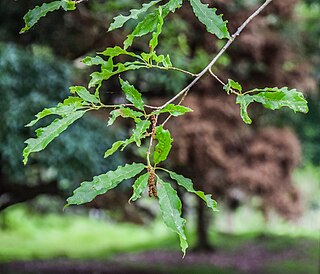
Quercus lancifolia is a species of oak found in Central America and Mexico.
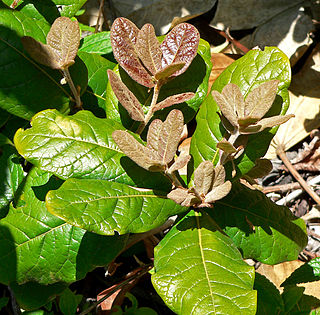
Quercus costaricensis is a species of oak native to Central America. It is often found with Quercus copeyensis in the upper montane forests, to 3,100 metres elevation. The leaves are tough and leathery with a short petiole and toothed margin. Wind is the primary pollinator. Squirrels are their main seed predator but also their main disperser as they commonly lose their buried seeds.

The Talamancan montane forests ecoregion, in the tropical moist broadleaf forest biome, are in montane Costa Rica and western Panama in Central America.
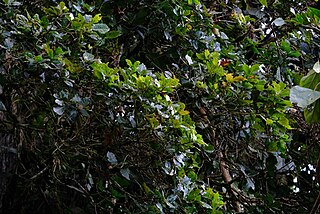
Quercus copeyensis is a species of oak endemic to the Talamancan montane forests of Costa Rica and Panama. It is commonly called Panamanian oak.
Freziera biserrata is a species of plant in the Pentaphylacaceae family. It is endemic to Costa Rica.
Guarea pyriformis is a species of plant in the family Meliaceae. It is endemic to Costa Rica.
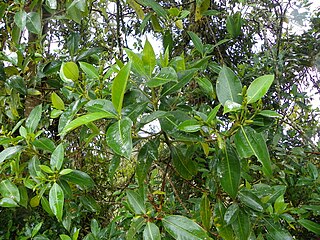
Hedyosmum is a genus of flowering plants in the family Chloranthaceae. There are about 40 to 45 species. They are distributed in Central and South America and the West Indies, and one species also occurs in southeastern Asia. They are mostly dioecious, except for H. nutans and H. brenesii which are exclusively monoecious, and H. scaberrimum and H. costaricense with both monoecious and dioecious individuals.
Nectandra hypoleuca is a species of plant in the family Lauraceae. It is endemic to Costa Rica.
Ocotea rivularis is a species of evergreen tree in the plant genus Ocotea of the family Lauraceae. It is endemic to Costa Rica.
Persea brenesii is a species of plant in the family Lauraceae. It is endemic to Costa Rica.

Quercus benthamii is a species of oak in the family Fagaceae. It is native to the cloud forests of Central America and southern Mexico. It is threatened by habitat loss.
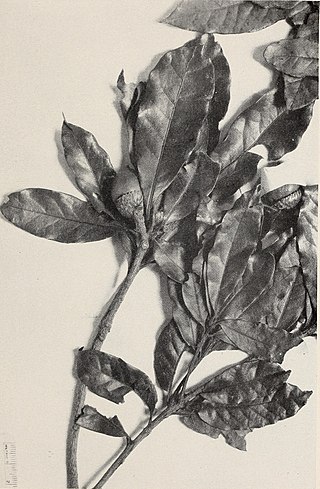
Quercus tonduzii is a species of oak. It is endemic to Costa Rica. It is placed in section Lobatae.
Adolphe Tonduz (1862-1921) was a Swiss botanist who collected plants in both Guatemala and Costa Rica. He was the first director of the National Herbarium of Costa Rica, which was founded in 1887. Together with Henri Pittier he published 'Primitae Florae Costaricensis' and 'Herborisations au Costa Rica'.
Quercus oleoides, with Spanish common names encina or encino, is a Mesoamerican species of oak in the southern live oaks section of the genus Quercus. It grows in dry forests and pastureland of eastern and southern Mexico and much of Central America, from Guanacaste Province in Costa Rica north as far as the State of Tamaulipas in northeastern Mexico.

Godyris zavaleta, the Zavaleta glasswing, is a species of butterfly of the family Nymphalidae. It is found from Costa Rica to southern Peru. The habitat consists of lowland and mid-elevation rainforests at altitudes up to 900 meters.
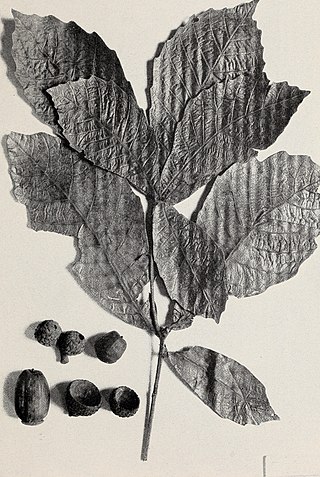
Quercus oocarpa is a Mesoamerican species of oak.
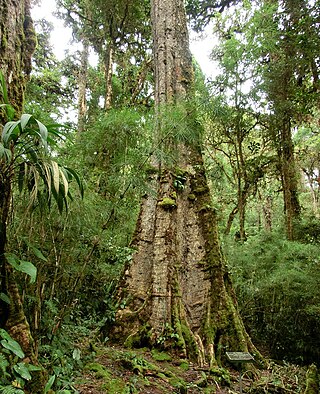
Quercus sapotifolia is a species of oak. It is native to southern and western Mexico as well as Central America. It is threatened by habitat loss.












